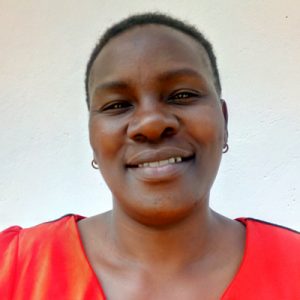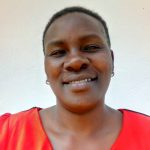In recent years, Ebwaliro Primary School has grown to 1,527 students from the Early Childhood Class through Grade 8. The school boasts of being champions in music and drama clubs, and excellent players of football and netball (similar to volleyball) as evidenced by trophies inside the Headteacher’s office.
Understandably, with such a large student population, the demands for water are huge to provide enough water for drinking, cooking, and school hygiene.
Currently, the school has two rain tanks and a protected dug well, but due to seasonality, they cannot be relied upon to provide the needed water. Most of the time they are dry and it is up to the students to bring water from home each day.
"Carrying water in the morning is heavy and it makes me very tired which causes me to be late. I need to come in early," said Sakinah K. ( in the photo below), age 12.

Using water from unknown contaminated sources is leading to children and teachers getting sick with water-related illnesses like diarrhea, amoeba, and typhoid. This causes a lot of absenteeism and affects the overall school performance.
“It really affects performance because when students get sick, they are absent, and delivering results becomes a challenge to me as the school head. I really need a permanent solution to the water crisis,” said David Nduku, a 52-year-old teacher.
Drilling a borehole well will meet the water needs of the school and allow students the opportunity to focus on learning so they can have a bright future.
What We Can Do:
New Well
We conducted a hydrogeological survey at this school, and the results indicated the water table beneath it is an ideal candidate for a borehole well. Due to a borehole well's unique ability to tap into a safe, year-round water column, it will be poised to serve all of the water needs for this school's large population, even through the dry season.
The school will help collect the needed construction materials such as sand, rocks, and water for mixing cement. They will also provide housing and meals for the work team, in addition to providing local laborers. We will complement their materials by providing an expert team of artisans and drilling professionals, tools, hardware, and hand-pump. Once finished, the school’s students and staff will use water from the well and staff for drinking, handwashing, cooking, cleaning, and much more.
The school and we strongly believe that all of these components will work together to improve standards at this school, which will help lead to better student academic performance and unlock the opportunity for these students to live better, healthier lives.
Handwashing Stations
The student health club will oversee two new handwashing stations we will provide and ensure they are kept clean and in working condition. The club leaders will fill the handwashing stations with water daily and make sure they are always supplied with a cleaning agent such as soap or ash.
VIP Latrines
Two triple-door latrine blocks will be constructed with local materials that the school will help gather. Three doors will serve the girls, and three doors will serve the boys. These new latrines will have cement floors designed to be easy to use and clean. And with a rain tank right on school property, there should be enough water to keep them clean.
Training on Health, Hygiene, COVID-19, and More
We will hold a one-day intensive training session with students, teachers, and parents. This training will cover a wide range of topics, including COVID-19 symptoms, transmission routes and prevention; personal and environmental hygiene; and the operation and maintenance of the rain tank, latrines, and handwashing stations. There will be a special emphasis on handwashing.
Our team of facilitators will use various methods to train, including participatory hygiene and sanitation transformation and asset-based community development. We will initiate a student health club, which will prepare students to lead other pupils into healthy habits at school and home. We will also lead lectures, group discussions and provide illustrative handouts to teach health topics and promote good hygiene practices within the school, including handwashing and water treatment. We will then conduct a series of follow-up training before transitioning to our regularly scheduled support visits throughout the year.

 Borehole Well and Hand Pump
Borehole Well and Hand Pump
 Rehabilitation Project
Rehabilitation Project





































